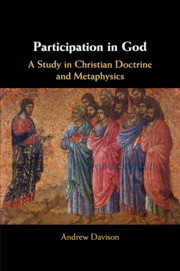Book contents
- Participation in God
- Participation in God
- Copyright page
- Dedication
- Epigraph
- Contents
- Acknowledgements
- Works of Thomas Aquinas: Texts, Translations, and Abbreviations
- Introduction
- I Participation and Causation
- II The Language of Participation and Language as Participation
- III Participation and the Theological Story
- IV Participation and the Shape of Human Life
- Conclusion
- Bibliography
- Index of Names
- Subject Index
- Index of Biblical References
- Index of Works of Aquinas
IV - Participation and the Shape of Human Life
Published online by Cambridge University Press: 15 August 2019
- Participation in God
- Participation in God
- Copyright page
- Dedication
- Epigraph
- Contents
- Acknowledgements
- Works of Thomas Aquinas: Texts, Translations, and Abbreviations
- Introduction
- I Participation and Causation
- II The Language of Participation and Language as Participation
- III Participation and the Theological Story
- IV Participation and the Shape of Human Life
- Conclusion
- Bibliography
- Index of Names
- Subject Index
- Index of Biblical References
- Index of Works of Aquinas
Summary
The final chapters of this book look at how a participatory outlook can inform and has informed a vision of the world and what it means to live, act, pray, and seek God in it. This, the first of these chapters, considers knowledge and knowing in participatory terms. Knowledge is seen as a participation of the knower in the known, or a sharing from the known to the knower. This undergirds a 'realist' epistemology, in that knowing rests on the reality of the thing that is known. That said, it also stresses the creaturehood and particularity of the knower and the manner of knowing: that which is known comes to be in the knower in the manner of the knower, whether we are talking about our knowledge of an animal, of a plant, or of God. In the case of God, most of all, the knower never exhausts the depths of what is known. That also applies, however, although to a different degree, in the knowledge of even mundane things, since their deepest reality is a participation in God, which confers a creaturely form of inexhaustibility. In these ways, much of this chapter is an exploration of 'intra-finite participation': about how one creature participates in, or donates to, another. It closes with a discussion of the relation between reason and revelation.
Keywords
- Type
- Chapter
- Information
- Participation in GodA Study in Christian Doctrine and Metaphysics, pp. 301 - 366Publisher: Cambridge University PressPrint publication year: 2019

